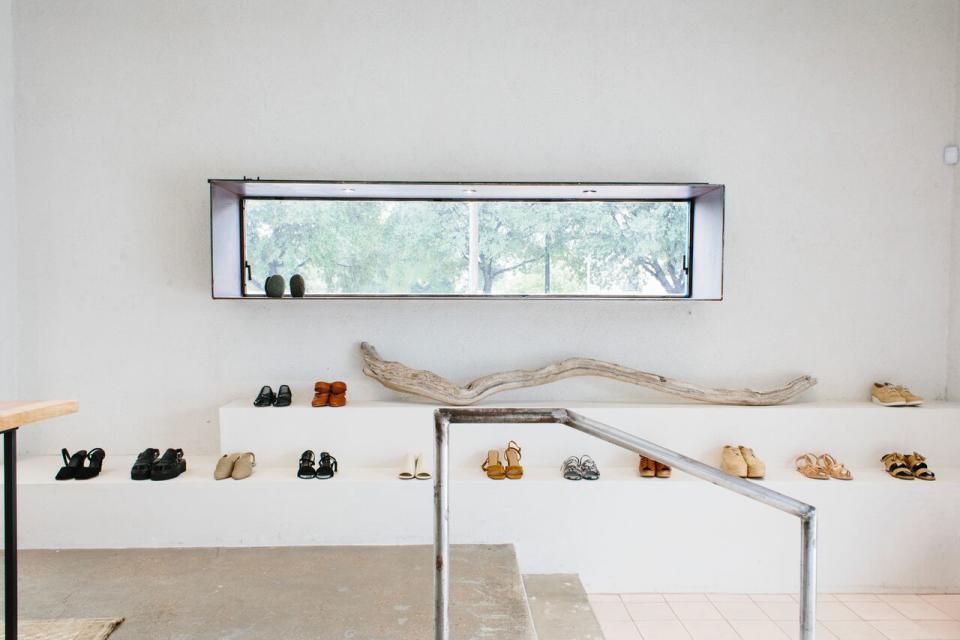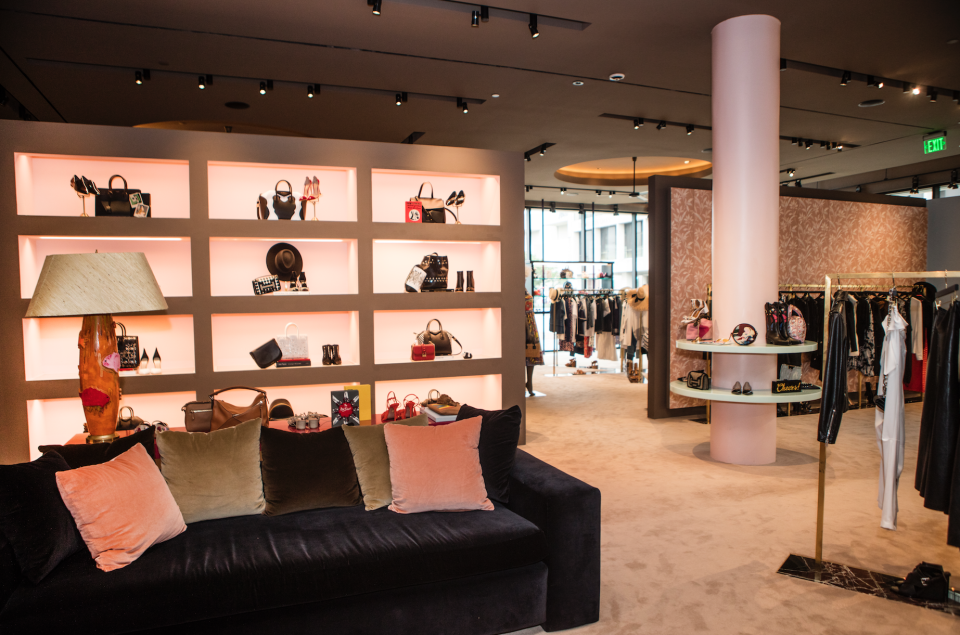In Texas, Retail Stores Open With Caution and Hope
Shopping, in this economy? The reality is that even during a global health crisis the urge to buy something new continues. As stores reopened in China earlier this year, lines formed outside Chanel boutiques. In France, which relaxed its social distancing regulations earlier this week, people were queued up at Zara. In Texas, where a stay-at-home order concluded on May 1, with businesses permitted to reopen at 25% capacity, people may not be lining up just yet—but they are shopping.
“We have seen steady sales across the board in all categories,” says Laure Heriard Dubreuil, the founder of The Webster, which operates one store in Texas, as well as three in Florida, two in California, and one in New York. “Of course, people have been buying a lot of leisurewear, and games like chess or puzzles from our home category. But just as much as they are buying pieces for their time at home, they are also buying inspirational looks, so we have seen strong sales in bags, dresses, and gems for future events and getaways. We have learned a lot about our clients during this time, and they very much dress the way they want to feel, many of them still maintain their everyday looks as if they were leaving the house.”
In Houston, where The Webster’s Texas outpost is based, people can, in fact, leave their houses, which presents a dilemma for luxury retailers that pride themselves on high-touch customer service. How can you offer many of the hallmarks of luxury retail—a glass of Champagne, an on-site seamstress, a warm greeting—without violating social distancing regulations?
“While our stylists will be respecting the six-feet social distance rule, it is our top priority that the expected level of customer service will not be compromised,” Heriard Dubreuil continues. “As we open our doors, we will continue to proceed under the CDC and states’ guidelines. We will be taking every precaution during this time to ensure the health, safety, and happiness of both our clients and employees. Our stores are thoroughly cleaned daily and rigorously sanitized in between each client. Our team will be required to wear masks, and we encourage our clients to do the same. If a client arrives without a mask, we will be able to offer our custom-made ones with upcycled LHD [Heriard Dubreuil’s own brand of swimwear and dresses] fabrics.”

Across the Lone Star State, retailers large and small have taken similar measures. Saks Fifth Avenue, which opened its stores in San Antonio and Houston, is keeping its housekeeping staff working all day to regularly sanitize the store. Staff will wear masks and undergo mandatory daily health screenings, while clothing will be “quarantined” for a 48 hours after being tried on in a fitting room. In addition, Saks is offering appointments, curbside pickup, and virtual shopping appointments via FaceTime or Zoom.
At Kick Pleat’s Austin and Houston stores, founder Wendi Martin says, “We have a list of procedures on every door of entry so everyone is clear upon walking in.” Those signs contain four bullet points: “Masks must be worn by both employees and customers, all surfaces and handles are cleaned after every customer visit, number of customers in the store are managed and do not surpass more than five customers at a time, [and] safe levels of social distancing are managed at all times.”
Martin opened her stores on May 1, in tandem with the relaxation of the state’s stay-at-home orders. “I was both very ready to open because I want to fight for my business, but also concerned about opening because of all the unknowns with the coronavirus. I ultimately decided that we would open because I think we can do it in a safe, cautious way.”
ByGeorge’s two luxury boutiques in Austin took an extra week to reopen. “We decided to open the following Friday. We needed to get our ducks in a row. We would have had only four days and there was a lot for us to do,” says Molly Nutter, the store’s president. All of ByGeorge’s employees will also be wearing masks and doing daily temperature checks, and the store has been outfitted with hand sanitizer stations and additional signage about safety precautions. In addition, the retailer installed a doorbell on both of its locations. “We want to be able to control the traffic into the store and the number of clients who can be in the store at the same time,” she says. Foot traffic, for now, is still lower than normal. “We have had walk-in traffic, but the majority have been clients who called ahead to set an appointment to come in,” Nutter says.
Martin echoes this: “Since we opened on May 1, we’ve had anywhere from two to 10 people come through the door in a day. Some people do call in ahead of time and we’ll prepare a dressing room for them, so they walk in and go straight to the dressing room without coming into much contact with anyone. It’s all about preferences at this point because everyone has such varying opinions on this topic and feels safe in all different kinds of ways. I want to respect that and make it easy for our clients.”

Socially distanced shopping, whether through in-store appointments or calling ahead for curbside pickup—options that all three retailers interviewed for this piece now offer—has potential to become the new normal. It might seem isolating, but in fact this is a retail experience that is far more personal than just stumbling into a store and thumbing through racks. “Our in-store stylists have strong relationships with their clients, curating their wardrobes and keeping them up to date on the latest arrivals, but during this time, we were able to forge even stronger bonds, expanding upon the personal connection and offering support to them any way we could,” says The Webster’s Heriard Dubreuil.
“We’ve had clients who have seen things on social media or on the website and they will end up purchasing on the website or calling us to ship to them,” says ByGeorge’s Nutter, continuing with a laugh. “If someone wants to come and shop with us on a Wednesday at two in the morning, we’ll come here and do the appointment. We haven’t done that yet, but we have been taking off-hour appointments.”
Kick Pleat’s Martin continues: “I know that we’ll keep offering options and making our customers’ experience as seamless and joyful as possible. If they want to come in-store we’ll make it clean and relaxing. If they want a drop-off we’ll do that. If they want to call in and come in out of hours we will do that,” also with a laugh, “basically I’ll mow their lawn if they need it.”
In this, a salesperson at a store is no longer a nameless clerk behind a desk. A store is not a place to sit down while you wait for your brunch reservation. The act of shopping, of spending the money you have to support a designer, a boutique, and an economy, is not passive—it’s active, intentional, and careful. “Small specialty stores offer something that large department stores or even e-commerce can never provide, so we’re always looking to make that the underlying principle of the business,” says Nutter.
Nutter describes her most successful products right now as “things that elicit some emotion: Dries Van Noten, Loewe, Elder Statesman, Zero + Maria Cornejo, Dosa, Cristaseya, Kilometre, and Ulla Johnson, for instance. Tops and easy dresses have fared particularly well. Basically, their preferences are similar to what they were prior—I would say that shopping has given them a sense of normalcy and optimism.” I am, therefore I shop.
Originally Appeared on Vogue

